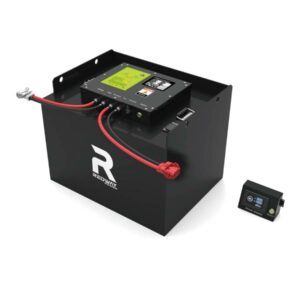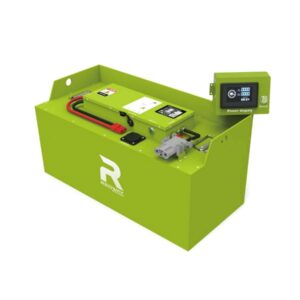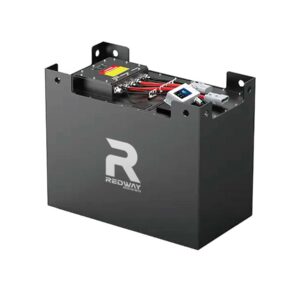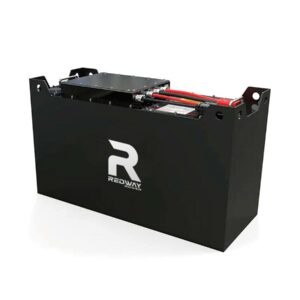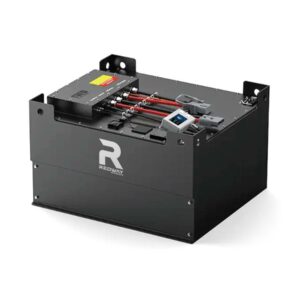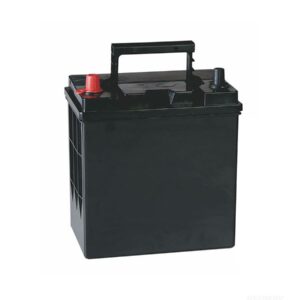Description
Introducing the 48V 300Ah LiFePO4 Forklift Battery, a high-performance energy solution manufactured in China, specifically designed for demanding industrial applications. This advanced lithium iron phosphate (LiFePO4) battery delivers exceptional power and reliability, making it an ideal choice for OEM, ODM, and wholesale buyers looking to enhance their material handling operations.
Key Features
- High Energy Capacity: With a nominal voltage of 48V and a capacity of 300Ah, this battery provides approximately 15.36 kWh of reliable energy storage, ensuring extended operational needs for various applications.
- Long Cycle Life: Designed for over 2,000 cycles at 80% Depth of Discharge (DOD), this battery offers exceptional longevity, significantly reducing replacement costs and downtime compared to traditional lead-acid batteries.
- Superior Discharge Performance: Capable of handling continuous discharge currents up to 100A and peak discharge currents of 200A for short bursts, this battery meets the high demands of industrial applications.
- Durable & Weatherproof: Rated at IP65, this battery features a robust metal casing that protects against dust and water ingress, ensuring reliable performance in harsh environments.
- Advanced Battery Management System (BMS): Equipped with an intelligent BMS that includes real-time monitoring, overcharge protection, and communication capabilities via RS485 and CAN-bus for efficient fleet management.
Product Description
The 48V 300Ah LiFePO4 Forklift Battery is engineered to provide optimal performance and reliability in heavy-duty industrial settings.
- Nominal Voltage: Operates at a nominal voltage of 48V, delivering consistent power throughout long operational hours.
- Energy Output: Offers a total energy output of approximately 15.36 kWh, ensuring long-lasting performance without the frequent need for recharging.
- Versatile Voltage Range: This battery operates efficiently within a voltage range of 40V to 58.4V, making it compatible with various forklift models.
- Compact Dimensions: With dimensions of approximately 728 x 350 x 530 mm and weighing around 125 kg, it facilitates easy installation and integration into existing systems.
Safety is prioritized with the advanced BMS that continuously monitors critical parameters such as State of Charge (SOC), voltage, current, and temperature. This system enhances performance while prolonging battery life by preventing potential hazards like overcharging or overheating.
- Long Lifespan: With a cycle life exceeding 2,000 cycles at an 80% DOD, this lithium battery is built to last, significantly reducing the total cost of ownership compared to traditional lead-acid batteries.
- Temperature Tolerance: Capable of operating in extreme temperatures ranging from -20°C to 60°C, making it an excellent choice for diverse working environments.
The battery supports various communication protocols including RS485 and CAN-bus, allowing for seamless integration with existing monitoring systems. This enables fleet managers to track battery health and performance in real-time.Ideal for OEM, ODM, and wholesale buyers, this forklift battery can be customized to meet specific operational needs. Flexible delivery options such as FOB, EXW, and CIF are available to ensure smooth procurement processes.Choose the 48V 300Ah LiFePO4 Forklift Battery for a reliable power source that enhances productivity while ensuring safety and efficiency in your material handling operations! Contact us today to discuss how we can meet your specific requirements with our innovative battery technology!
48V 300Ah LiFePO4 Applications
What are 48V 300Ah LiFePO4 batteries used for?
48V 300Ah LiFePO4 batteries are commonly used in electric forklifts, material handling equipment, automated guided vehicles (AGVs), and warehouse energy storage systems. Their high capacity ensures prolonged usage in industrial environments, providing efficient power for high-demand applications such as long shifts in warehouses and manufacturing facilities.
Who manufactures OEM LiFePO4 forklift batteries in China?
Leading Chinese manufacturers of OEM LiFePO4 forklift batteries include CATL, BYD, EVE Energy, Gotion High-Tech, and CALB. These companies produce high-quality, cost-effective lithium batteries for forklifts and industrial applications, with advanced Battery Management Systems (BMS) and customization options.
Why choose high capacity LiFePO4 for forklifts?
High-capacity 48V 300Ah LiFePO4 batteries provide longer operational runtimes, faster charging, and reduced maintenance costs compared to traditional lead-acid batteries. They offer better energy efficiency and durability, making them ideal for heavy-duty forklifts that require continuous use, increasing productivity and lowering operational downtime.
Can LiFePO4 batteries be customized for warehouse equipment?
Yes, LiFePO4 batteries can be customized for warehouse equipment to meet specific voltage, capacity, and form factor requirements. Manufacturers offer tailored solutions to match unique operational needs, ensuring compatibility with forklifts, AGVs, and other warehouse machinery, improving performance and safety.
What are 300Ah lithium battery OEM solutions in China?
300Ah lithium battery OEM solutions in China include custom-designed batteries with optimized BMS, high energy density, and long cycle life. These batteries are tailored for industrial applications such as forklifts, AGVs, and warehouse energy systems. Chinese OEM suppliers offer competitive pricing and flexible customization options for bulk orders.
Which suppliers offer long lifespan LiFePO4 forklift batteries?
Top suppliers offering long-lifespan LiFePO4 forklift batteries include CATL, BYD, EVE Energy, and CALB. These manufacturers provide batteries with 3,000 to 5,000 charge cycles, ensuring long-term durability and reliability for industrial applications. They also integrate advanced BMS for optimal battery health and performance.
China OEM Lithium Battery Standards
What are the top China OEM lithium forklift battery manufacturers?
Top Chinese OEM lithium forklift battery manufacturers include CATL, BYD, EVE Energy, Gotion High-Tech, and CALB. These companies offer reliable, high-quality LiFePO4 batteries with excellent performance and safety standards, commonly used in forklifts and industrial equipment worldwide.
How do Chinese OEMs ensure lithium battery safety standards?
Chinese OEMs ensure lithium battery safety through rigorous testing, advanced Battery Management Systems (BMS), and adherence to international safety standards like UL 1642 and IEC 62619. They also implement multi-stage testing, including overcharge, short-circuit, and thermal stability tests, to prevent battery failures.
What certifications are required for OEM lithium forklift batteries?
OEM lithium forklift batteries require certifications such as UL 1642, CE, UN38.3, IEC 62619, and ISO 9001. These certifications ensure the batteries meet international safety, quality, and environmental standards, guaranteeing their reliability and safe operation in industrial settings.
How do China OEMs customize batteries for specific forklift models?
Chinese OEMs customize lithium batteries by adjusting voltage, capacity, BMS configurations, and form factor to fit specific forklift models. Custom designs ensure that the batteries meet operational requirements, enhancing efficiency and safety for the end-user.
What are the latest lithium battery tech trends in China OEMs?
The latest trends in China’s OEM lithium battery sector include advanced Battery Management Systems (BMS), energy density improvements, fast-charging technologies, and enhanced safety features. There is also a growing emphasis on sustainability, battery recycling, and integration with renewable energy systems.
How do Chinese OEMs handle lithium battery recycling and disposal?
Chinese OEMs follow strict recycling guidelines and invest in sustainable disposal solutions to minimize environmental impact. They adhere to global standards for battery recycling, including responsible handling of lithium and other hazardous materials to ensure eco-friendly end-of-life management.
LFP Forklift Battery Benefits
What are key advantages of LFP forklift batteries?
LiFePO4 (LFP) forklift batteries offer longer lifespan, fast charging, higher energy efficiency, and lower maintenance compared to lead-acid batteries. They also have better thermal stability, a higher level of safety, and reduce downtime, making them ideal for high-demand industrial environments.
Which industries use high-capacity LFP forklift batteries?
High-capacity LFP forklift batteries are used in warehousing, logistics, manufacturing, automotive, and retail sectors. These industries rely on efficient, durable power sources for forklifts and material handling equipment, reducing operational costs and increasing productivity.
How long do lithium iron phosphate forklift batteries last?
Lithium iron phosphate (LFP) forklift batteries typically last 3,000 to 5,000 cycles, which translates to 8-10 years of operational life with proper care. This longevity, combined with reduced maintenance, makes them a cost-effective choice for industrial applications.
What safety features do LFP forklift batteries offer?
LFP forklift batteries are thermally stable, fire-resistant, and feature advanced Battery Management Systems (BMS) that protect against overcharging, over-discharging, and short-circuiting. These safety features ensure the batteries are reliable, with reduced risk of failure or accidents in industrial settings.
How do LFP batteries compare to lead-acid in forklifts?
LFP batteries offer longer lifespan, faster charging, reduced maintenance needs, and higher energy efficiency than lead-acid batteries. They also have better thermal stability and do not require water refills, making them a more cost-effective, low-maintenance alternative for forklifts.
What maintenance maximizes LFP forklift battery lifespan?
To maximize LFP forklift battery lifespan, maintain proper charging cycles, avoid deep discharges, and store the battery in a temperature-controlled environment. Regularly check BMS functions and clean battery terminals to ensure optimal performance.
LiFePO4 in Warehouse Equipment
What are the key advantages of LiFePO4 batteries in warehouse equipment?
LiFePO4 batteries offer longer operational runtimes, faster charging, and minimal maintenance in warehouse equipment. They reduce downtime and improve energy efficiency, making them ideal for forklifts, automated guided vehicles (AGVs), and other material handling systems.
How do LiFePO4 batteries compare to traditional lead-acid alternatives?
LiFePO4 batteries outperform lead-acid by offering faster charging times, greater energy efficiency, longer cycle life, and lower maintenance. They are safer, with less risk of overheating or acid spills, providing a more reliable and cost-effective solution for warehouse operations.
What factors influence custom LiFePO4 battery design for warehouse use?
Factors influencing custom LiFePO4 battery design include required capacity, voltage, charging speed, form factor, and integration with existing equipment. Custom designs ensure that batteries meet the specific energy demands and operational needs of warehouse systems.
Are LiFePO4 batteries suitable for high-temperature warehouse environments?
LiFePO4 batteries perform well in moderate temperature ranges, typically from 0°C to 45°C. For high-temperature warehouse environments, additional thermal management systems may be required to prevent overheating and ensure safe and efficient battery operation.
What safety certifications are required for industrial LiFePO4 batteries?
Industrial LiFePO4 batteries require certifications like UL 1642, CE, UN38.3, IEC 62619, and ISO 9001. These certifications validate the battery’s compliance with safety, quality, and environmental standards, ensuring reliable and safe performance in industrial applications.
How to optimize LiFePO4 battery lifespan in heavy-duty warehouse equipment?
To optimize lifespan, ensure regular charging cycles within the recommended range, avoid deep discharges, and implement temperature control. Proper maintenance and use of a quality Battery Management System (BMS) will also extend the battery’s life in heavy-duty equipment.
300Ah Lithium Battery OEM in China
What are China’s advantages in 300Ah lithium battery OEM?
China’s advantages in 300Ah lithium battery OEM include high production capacity, advanced manufacturing technologies, cost-effective solutions, and flexibility in customization. Chinese OEMs offer tailored solutions for various applications while maintaining global safety standards.
Typical applications for 300Ah lithium battery OEM solutions?
300Ah lithium battery OEM solutions are commonly used in forklifts, electric vehicles, industrial energy storage, and automated material handling systems. These batteries provide high energy capacity, making them suitable for operations requiring prolonged power use and efficient energy storage.
Certifications required for 300Ah lithium battery OEM in China?
Required certifications for 300Ah lithium battery OEM in China include UL 1642, CE, UN38.3, IEC 62619, and ISO 9001. These certifications ensure compliance with global safety, quality, and environmental standards, making the batteries suitable for industrial and commercial use.
Customization options for 300Ah lithium battery OEM designs?
Chinese OEMs offer customization options for voltage, capacity, BMS integration, and physical design to meet specific operational needs. Custom solutions are tailored for forklifts, EVs, and industrial equipment, providing optimal performance in different environments.
How do Chinese OEMs ensure 300Ah battery quality control?
Chinese OEMs implement rigorous testing, automated production lines, and quality checks at every stage, from material selection to final assembly. They adhere to international safety and quality standards, ensuring consistent battery performance and reliability.
Cost comparison: 300Ah lithium battery OEM China vs others?
China’s 300Ah lithium batteries are generally more cost-effective compared to batteries from Western manufacturers due to lower production costs and economies of scale. However, pricing may vary based on customization, quality standards, and certifications required by the client.
Choosing LiFePO4 Forklift Suppliers
What are key factors in choosing LiFePO4 forklift battery suppliers?
Key factors in choosing LiFePO4 forklift battery suppliers include battery performance (capacity, cycle life), safety certifications, customization options, and after-sales support. Ensuring that suppliers meet international standards and can offer tailored solutions is also crucial for operational efficiency.
How do LiFePO4 forklift batteries compare to traditional options?
LiFePO4 forklift batteries offer longer lifespan, quicker charging, higher energy efficiency, and minimal maintenance compared to traditional lead-acid batteries. They also provide improved safety and reliability, reducing operational costs in the long run.
What maintenance extends LiFePO4 forklift battery lifespan?
To extend the lifespan of LiFePO4 forklift batteries, avoid deep discharges, maintain proper charging levels, and ensure temperature regulation. Regular monitoring of the Battery Management System (BMS) and proper storage also contribute to longer battery life.
Which certifications ensure reliable LiFePO4 forklift battery suppliers?
Reliable suppliers typically hold certifications like UL 1642, CE, UN38.3, IEC 62619, and ISO 9001, ensuring compliance with global safety and quality standards for forklift battery systems. These certifications indicate the supplier’s commitment to safety and reliability.
What cost benefits do long-life LiFePO4 forklift batteries offer?
Long-life LiFePO4 forklift batteries offer reduced maintenance, lower replacement costs, and improved energy efficiency, resulting in a lower total cost of ownership over time. Their extended lifespan reduces operational downtime and maintenance labor costs, making them more cost-effective in the long run.
How is LiFePO4 technology evolving for forklift batteries?
LiFePO4 technology is evolving with improved energy density, faster charging capabilities, and more advanced Battery Management Systems (BMS). Manufacturers are also focusing on enhancing safety features and integrating sustainable recycling practices to meet global environmental standards.


